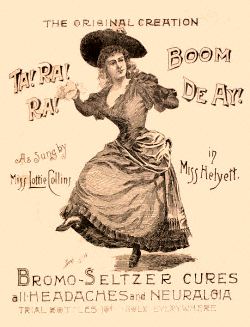Hello all,
The subject of "Eight little whores" and it's invention by Donald McCormick got me thinking as to the other little rhymes in his book.
In the original hardback edition of "The Identity of Jack the Ripper" from 1959 (Jarrolds), the reference to the famous Music Hall song Ta-ra-ra Boom-de-ay on page 145 says the following:-
"Naming Jack the Ripper became almost a parlour game in the years between 1888 and 1900. Many criminologists are apt to be romantics and there was a great temptation to identify the 'Ripper' with some other villain executed for other offences round about this period "... and wove Frederick Deeming's demise into the song, calling him the Ripper.
"Such doggerel led to the statement in the Press that 'Scotland Yard is convinced that the 'Ripper' was Frederick Deeming, who was caught in Australia for the murder of his wife in Britain'.
The verse itself is found under the suspects section on this site.
What struck me was that Deeming was arrested in March 1892. I simply looked up the origin of the song.
I found that it was originally an American Music Hall song from 1891 from "Tuxedo", and didn't become popular until first performed in 1892 in Britain under the production of an Opera "Miss Heylett". A version appeared in France in 1891 (in French).
For the music hall song to have gained popularity firstly, and then the lyrics involving Deeming's scaffold visit to have been included, it would have to have had time to gather it's popularity. Where McCormick interwove this doggerel into the story however, he failed to provide any example of this song being in print in the form he suggested. I have trawled through many a magazine and newspaper looking for this in print, and have come to the inevitable conclusion that McCormick (and or an associate who Melvin Harris referred to) has invented the lines of the doggerel himself.
It is noted with some amusement that the reference and verse do NOT appear in the paperback revised version of the book from 1970 (Arrow).
best wishes
Phil
The subject of "Eight little whores" and it's invention by Donald McCormick got me thinking as to the other little rhymes in his book.
In the original hardback edition of "The Identity of Jack the Ripper" from 1959 (Jarrolds), the reference to the famous Music Hall song Ta-ra-ra Boom-de-ay on page 145 says the following:-
"Naming Jack the Ripper became almost a parlour game in the years between 1888 and 1900. Many criminologists are apt to be romantics and there was a great temptation to identify the 'Ripper' with some other villain executed for other offences round about this period "... and wove Frederick Deeming's demise into the song, calling him the Ripper.
"Such doggerel led to the statement in the Press that 'Scotland Yard is convinced that the 'Ripper' was Frederick Deeming, who was caught in Australia for the murder of his wife in Britain'.
The verse itself is found under the suspects section on this site.
What struck me was that Deeming was arrested in March 1892. I simply looked up the origin of the song.
I found that it was originally an American Music Hall song from 1891 from "Tuxedo", and didn't become popular until first performed in 1892 in Britain under the production of an Opera "Miss Heylett". A version appeared in France in 1891 (in French).
For the music hall song to have gained popularity firstly, and then the lyrics involving Deeming's scaffold visit to have been included, it would have to have had time to gather it's popularity. Where McCormick interwove this doggerel into the story however, he failed to provide any example of this song being in print in the form he suggested. I have trawled through many a magazine and newspaper looking for this in print, and have come to the inevitable conclusion that McCormick (and or an associate who Melvin Harris referred to) has invented the lines of the doggerel himself.
It is noted with some amusement that the reference and verse do NOT appear in the paperback revised version of the book from 1970 (Arrow).
best wishes
Phil



Comment